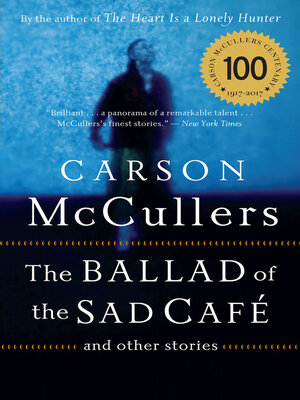
Sign up to save your library
With an OverDrive account, you can save your favorite libraries for at-a-glance information about availability. Find out more about OverDrive accounts.
Find this title in Libby, the library reading app by OverDrive.



Search for a digital library with this title
Title found at these libraries:
| Library Name | Distance |
|---|---|
| Loading... |
A Southern woman is undone by love and gossip in the classic novella, one of seven stories in this “brilliant . . . panorama of remarkable talent” (The New York Times).
One of the most celebrated and enduringly popular works in Southern literature, this collection assembles Carson McCullers’s best stories, including her beloved novella “The Ballad of the Sad Café.” A haunting tale of love and violence in a small Southern town, the novella introduces readers to Miss Amelia, a formidable woman whose home serves as the town’s gathering place. Among other fine works, the collection also includes McCullers’s first published story, “Wunderkind,” about a musical prodigy who suddenly realizes she will not go on to become a great pianist.
First published in 1951, The Ballad of the Sad Café was adapted for the stage by the Edward Albee and later made into a film starring Vanessa Redgrave and Keith Carradine.
“McCullers's finest stories.” —The New York Times
One of the most celebrated and enduringly popular works in Southern literature, this collection assembles Carson McCullers’s best stories, including her beloved novella “The Ballad of the Sad Café.” A haunting tale of love and violence in a small Southern town, the novella introduces readers to Miss Amelia, a formidable woman whose home serves as the town’s gathering place. Among other fine works, the collection also includes McCullers’s first published story, “Wunderkind,” about a musical prodigy who suddenly realizes she will not go on to become a great pianist.
First published in 1951, The Ballad of the Sad Café was adapted for the stage by the Edward Albee and later made into a film starring Vanessa Redgrave and Keith Carradine.
“McCullers's finest stories.” —The New York Times







